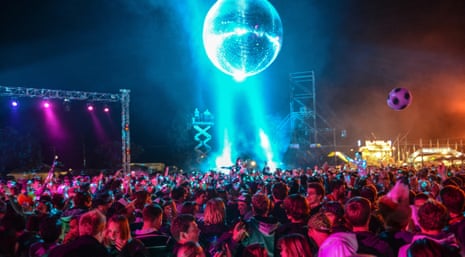In April 2013 word got out that Daft Punk planned to launch their album Random Access Memories from a regional Australian town barely anyone had heard of.
Dubbed the “cotton capital” of Australia, the small town (population 2,000) with the evocative name of Wee Waa in the Narrabri shire of New South Wales was not much known as a dance music hub. The news, which began with murmurs about Sony label reps scoping the area for locations, seemed just bizarre enough to be true. Daft Punk, after all, were never great adherents of the traditional album rollout – and, with the revered French duo announcing their split this week, it’s worth taking ourselves back to their strangest one.
In the long lead-up to Random Access Memories we were told to expect a departure from their three previous albums. Thomas Bangalter and Guy-Manuel de Homem-Christo, the reticent Frenchmen inside the robot helmets, had spared no expense in recreating the lush production values of 70s and 80s disco. Such luxury seemed fit for a Parisian fashion show, not a dusty showground in regional Australia.

Confirming the Wee Waa plans in an interview with the national youth broadcaster Triple J, Bangalter described the album as made for “anywhere and everywhere”. Random Access Memories would enter the world as part of the Friday-night festivities at the 79th annual Wee Waa agricultural show in May, before business as usual on Saturday (woodchopping competitions, flower arranging, variety show Wee Waa Has Talent, etc). The duo also liked Wee Waa’s proximity to the CSIRO Australia telescope, which some fans read as a clue to grander plans. (In reality, Bangalter and de Homem-Christo just like space, whether it’s the widescreen vistas of their avant-garde 2006 road movie Electroma, or the Apollo 17 mission sampled in the Random Access Memories closer Contact.)
The 4,000 tickets released on the Narrabri Crossing Theatre website sold out in a flash. Despite Sony’s emphatic message that Daft Punk would not be there, many still dared to dream. The duo’s Australian tour in 2007, featuring the revered pyramid stage show, was still seared in our memories.
We had been told that this was the first time anyone in the world would hear the album – but, three days before the launch, Random Access Memories appeared on iTunes. Naysayers relished in the schadenfreude (why drive seven hours to hear an album that’s already online?) but the true believers carried on anyway.
Wee Waa residents embraced the invasion with good humour. As a convoy of cars and trucks pulled into town, they were greeted by shop windows adorned with Daft Punk signs and robot cutouts. You could pick up “punk pies” at the bakery, then visit the butcher for “random access rissoles” and “daft pork sausages”. Daft Punk nuts, some who had flown from overseas to be there, paraded the main street in elaborate costumes. Cardboard helmets in the style of the Random Access Memories cover image were everywhere. At the town pub, locals greeted the blow-ins with equal parts cheer and bemusement.

Friday at the Wee Waa showground was remarkably laidback for a global album launch. Throughout the afternoon, robots rugged up to cheer on the dog high jump and pet show. The then-Narrabri shire mayor, Conrad Bolton, circulated, greeting the onlookers. Between the sausage sizzle, horticulture competition and carnival rides, people searched for clues that Daft Punk might be coming.
Before the 8.30pm album launch, the showground was cleared to make way for a circular light-up dancefloor under a giant disco ball. After a fireworks show by Father Anthony Koppman’s exquisitely named pyrotechnics company Holy Smoke, the party began. There was no hoped-for hologram and certainly no Daft Punk – just Random Access Memories played loud, from Give Life Back to Music to Contact, in the middle of nowhere.
The all-new Daft Punk tour that some expected to kick off at Wee Waa never came. The duo’s next live appearance, at the 2014 Grammys, featured album collaborators Nile Rodgers and Pharrell alongside special guest Stevie Wonder. It was the kind of splashy performance that could never translate on the road. Daft Punk’s subsequent production work, on Kanye West’s Yeezus in 2013 and the Weeknd’s Starboy in 2016, signalled that they’d moved on.
But the will-they-or-won’t-they rumours heard at Wee Waa persisted in the years to come, from every Coachella to the Weeknd’s Super Bowl performance this month. Of course, Daft Punk’s refusal to take a victory lap is precisely what makes us want one so keenly. Their split this week after 28 years (many spent not doing much publicly at all) was the final shrug from a duo that never cared about the Super Bowl.
Humble as it was, there was something pure about the Wee Waa experiment. In the weeks that followed, Random Access Memories went through the inevitable hype-to-backlash cycle. Some missed the fist-pumping highs of past Daft Punk, others found the throwback vibe derivative and a bit naff. That feeling of letdown was only compounded by the years waiting for a follow-up that never arrived.
But under the disco ball at the 79th annual Wee Waa agricultural show, curios like Touch, featuring Paul Williams, made as much sense as pop hits Get Lucky and Lose Yourself to Dance. A simple album playback turned into something that’s apparently never going to happen again: a thousands-strong dancefloor, brought together by Daft Punk.

Comments (…)
Sign in or create your Guardian account to join the discussion